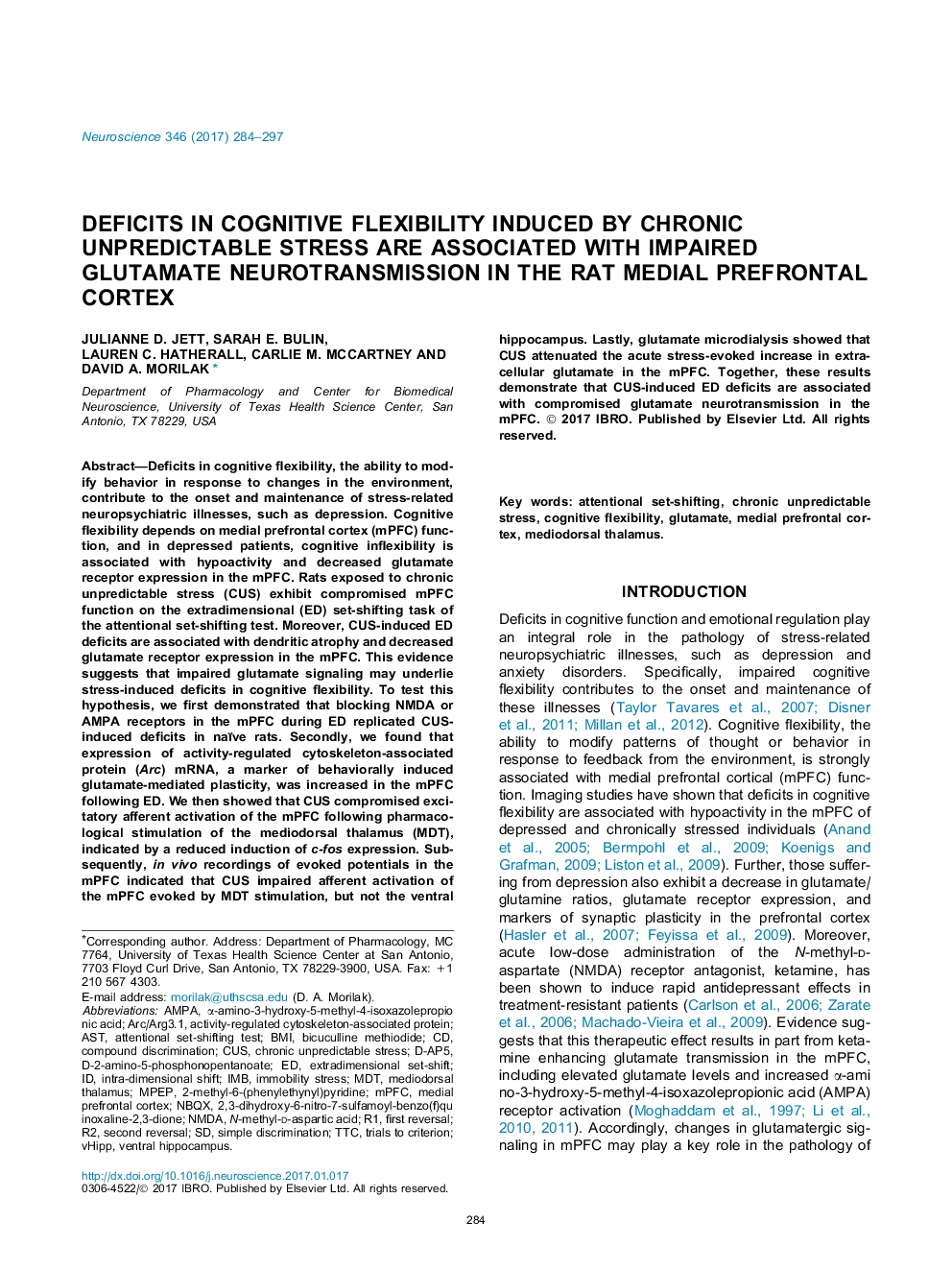| کد مقاله | کد نشریه | سال انتشار | مقاله انگلیسی | نسخه تمام متن |
|---|---|---|---|---|
| 5737953 | 1614730 | 2017 | 14 صفحه PDF | دانلود رایگان |
عنوان انگلیسی مقاله ISI
Deficits in cognitive flexibility induced by chronic unpredictable stress are associated with impaired glutamate neurotransmission in the rat medial prefrontal cortex
ترجمه فارسی عنوان
نقص در انعطاف پذیری شناختی ناشی از استرس غیر قابل پیش بینی مزمن با نارسایی انتقال دهنده عصبی گلوتامات در ناحیه قشر پیش فرناتال موش صحرایی
دانلود مقاله + سفارش ترجمه
دانلود مقاله ISI انگلیسی
رایگان برای ایرانیان
کلمات کلیدی
CuSAMPAcompound discriminationIMBD-2-amino-5-phosphonopentanoateArc/Arg3.1 - Arc / Arg3.1d-AP5 - D-AP5AST - آسپارتات ترانس آمینازchronic unpredictable stress - استرس غیر قابل پیش بینی مزمنα-amino-3-hydroxy-5-methyl-4-isoxazolepropionic acid - اسید α-آمینو 3-هیدروکسی-5-متیل-4-ایزوکسول پپونیکBMI - شاخص توده بدنیactivity-regulated cytoskeleton-associated protein - فعالیت پروتئین مرتبط با سیتوکسی سلولbicuculline methiodide - متیکویدید bicuculline
موضوعات مرتبط
علوم زیستی و بیوفناوری
علم عصب شناسی
علوم اعصاب (عمومی)
چکیده انگلیسی
Deficits in cognitive flexibility, the ability to modify behavior in response to changes in the environment, contribute to the onset and maintenance of stress-related neuropsychiatric illnesses, such as depression. Cognitive flexibility depends on medial prefrontal cortex (mPFC) function, and in depressed patients, cognitive inflexibility is associated with hypoactivity and decreased glutamate receptor expression in the mPFC. Rats exposed to chronic unpredictable stress (CUS) exhibit compromised mPFC function on the extradimensional (ED) set-shifting task of the attentional set-shifting test. Moreover, CUS-induced ED deficits are associated with dendritic atrophy and decreased glutamate receptor expression in the mPFC. This evidence suggests that impaired glutamate signaling may underlie stress-induced deficits in cognitive flexibility. To test this hypothesis, we first demonstrated that blocking NMDA or AMPA receptors in the mPFC during ED replicated CUS-induced deficits in naïve rats. Secondly, we found that expression of activity-regulated cytoskeleton-associated protein (Arc) mRNA, a marker of behaviorally induced glutamate-mediated plasticity, was increased in the mPFC following ED. We then showed that CUS compromised excitatory afferent activation of the mPFC following pharmacological stimulation of the mediodorsal thalamus (MDT), indicated by a reduced induction of c-fos expression. Subsequently, in vivo recordings of evoked potentials in the mPFC indicated that CUS impaired afferent activation of the mPFC evoked by MDT stimulation, but not the ventral hippocampus. Lastly, glutamate microdialysis showed that CUS attenuated the acute stress-evoked increase in extracellular glutamate in the mPFC. Together, these results demonstrate that CUS-induced ED deficits are associated with compromised glutamate neurotransmission in the mPFC.
ناشر
Database: Elsevier - ScienceDirect (ساینس دایرکت)
Journal: Neuroscience - Volume 346, 27 March 2017, Pages 284-297
Journal: Neuroscience - Volume 346, 27 March 2017, Pages 284-297
نویسندگان
Julianne D. Jett, Sarah E. Bulin, Lauren C. Hatherall, Carlie M. McCartney, David A. Morilak,
